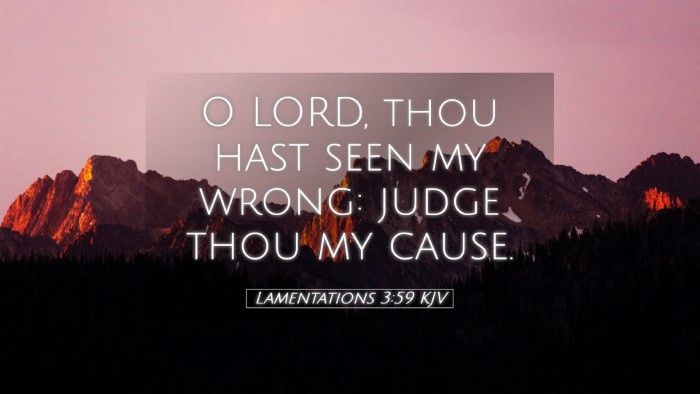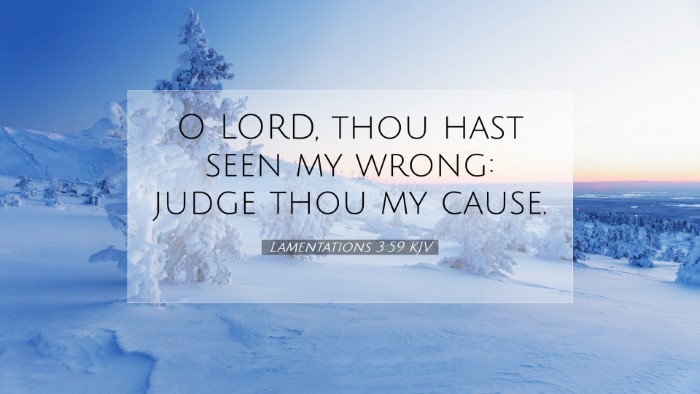Commentary on Lamentations 3:59
Lamentations 3:59 states: "O LORD, Thou hast seen my wrong; judge Thou my cause."
This verse is a poignant plea from the heart of the author, likely the prophet Jeremiah. It encapsulates a profound sense of anguish and a desire for divine justice amidst suffering.
Contextual Analysis
The Book of Lamentations expresses deep sorrow and mourning following the fall of Jerusalem. Written in a time of great national calamity, this verse stands as a direct appeal to God in the midst of despair.
- Historical Context: The lament reflects the psychological and spiritual state of the Jewish people after the Babylonian siege, emphasizing their collective guilt and suffering.
- Cultural Context: In ancient Israel, appealing to God for justice was customary, especially when the oppressed sought relief from their adversaries.
Insights from Commentators
Matthew Henry
Henry emphasizes the importance of recognizing God’s omniscience in situations of wrong and injustice. He notes that Jeremiah acknowledges God's awareness of personal grief and societal wrongs, indicating that divine justice is always at hand.
Albert Barnes
Barnes focuses on the phrase "judge Thou my cause," highlighting the author's belief that divine judgment is imperative. He asserts that the verse serves as a reminder for believers to entrust their grievances to God, who is the ultimate arbiter of justice.
Adam Clarke
Clarke interprets this verse as a declaration of hope amidst despair. He points out that the lamentation includes a faith that God will vindicate the wronged. Clarke's commentary encourages readers to maintain faith in God's righteousness, even when circumstances seem overwhelming.
Theological Significance
This verse significantly contributes to the doctrine of divine justice. It reflects a theological framework where human suffering is acknowledged, and God's corrective actions are anticipated. The lament serves both as a personal and communal recognition of the need for God's intervention.
- Human Suffering: It validates the experience of pain and injustice as a part of the human condition.
- Divine Justice: The declaration calls upon God’s justice as a source of hope, encouraging believers to seek God’s intervention in their lives.
Practical Applications
The lessons from Lamentations 3:59 are manifold for pastors, students, and theologians:
- Encouragement in Trials: Believers should find solace in the knowledge that God sees their struggles and wrongs.
- Restoration of Justice: This verse can empower individuals and communities to stand firm in their pursuit of justice, demonstrating that God’s judgment prevails over human unfairness.
- Prayer and Supplication: The act of bringing personal grievances before God is vital; this verse serves as a model for heartfelt prayer in times of distress.
Concluding Thoughts
Lamentations 3:59 resonates deeply with anyone grappling with injustice. It encapsulates a universal theme of seeking justice from the Lord, reminding believers that even in the bleakest moments, God is aware of their suffering and will judge in favor of righteousness.
This verse serves not only as a plea but also as a profound declaration of faith in God’s character and His justice. It invites all to approach God with their pains and grievances, confident that He will act according to His will.


